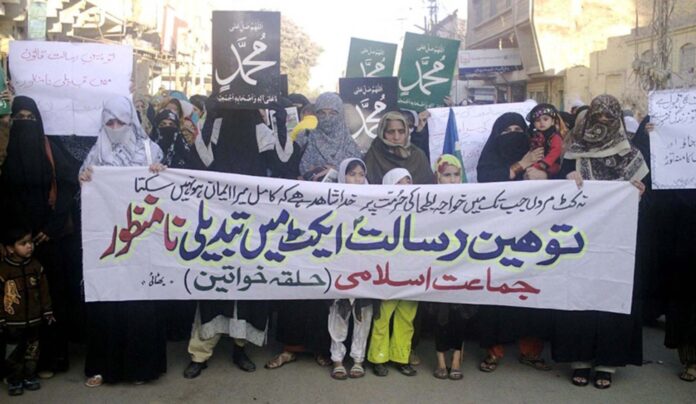Pakistan’s parliament has passed legislation which extends prison terms and fines for those disrespecting wives, family members and companions of Prophet Muhammad (pbuh).
The Senate passed the “Criminal Laws (Amendment) Bill 2023” yesterday which stipulates punishments of a minimum of 10 years and a maximum of life in prison, as well as a fine of one million rupees (approximately $3,500).
Previously, the maximum sentence for these acts was three years in prison.
Senator Mushtaq Ahmad Khan, one of the sponsors of the bill, said that the death penalty for blasphemy of the Prophet (pbuh) himself remains unchanged under the Penal Code of Pakistan.
The bill appears to take aim at some in the Shia community who openly curse one of the Prophet’s wives (may Allah be pleased with her) and his close companions (may Allah be pleased with them).
Jahangir Mohammed, director of the Ayaan Institute think tank, told 5Pillars that anti-hate laws in Pakistan are necessary.
“All societies need laws which promote social harmony and which outlaw incitement to people’s sacred beliefs,” he said. “Pakistan has had lots of issues relating to sectarian and religious hatred from extreme elements – both Sunni and Shia – so some kind of religious incitement laws are necessary to maintain peace and harmony and to clamp down on the worst excesses. And I’d rather have modern anti-hate laws than the antiquated British era blasphemy laws.”
Subscribe to our newsletter and stay updated on the latest news and updates from around the Muslim world!
He added: “But obviously given that this is Pakistan and laws are often used for political vendettas and score-settling, laws have to be proportionate and properly applied and not used for political purposes.”
As many as 4,000 people are estimated to have been killed by Shia-Sunni sectarian attacks in Pakistan between 1987–2007.
One significant aspect of the attacks in Pakistan is that militants often target Sunni and Shia places of worship during prayers in order to maximise fatalities and to emphasise the religious dimensions of their attacks.



















